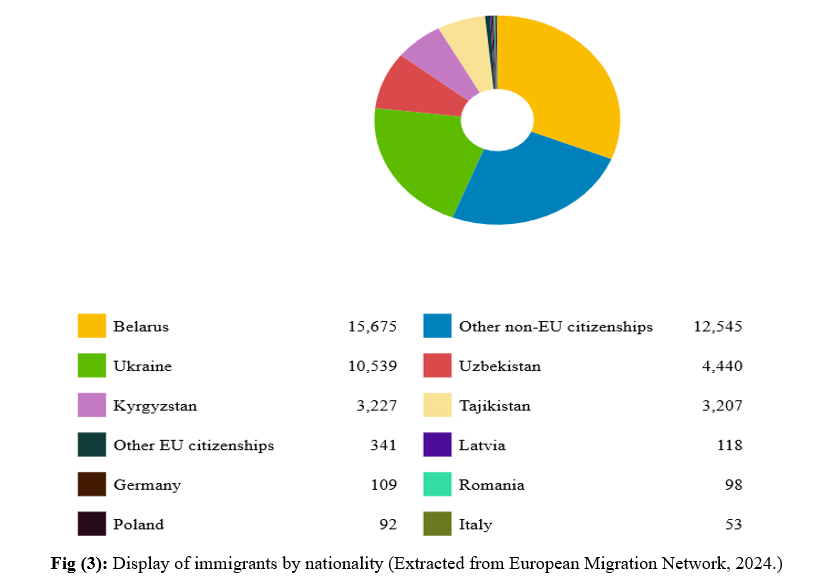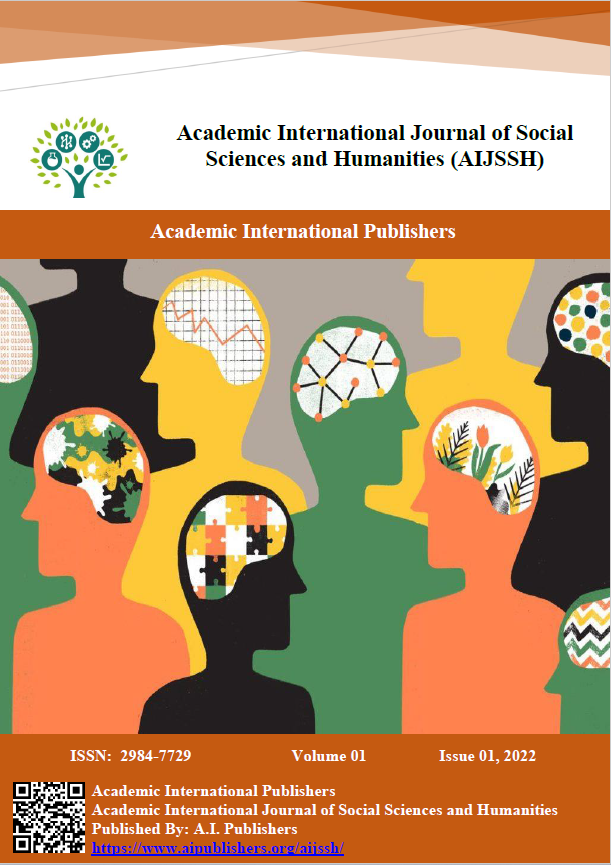The Impact of High Immigration in Lithuania: Addressing Challenges and Understanding Consequences
DOI:
https://doi.org/10.59675/S223Keywords:
Immigration, Emigration, living cost, migration, standard of livingAbstract
The maxim "too much of a good thing can turn sour" holds significant relevance across diverse aspects of life, indicating that exceeding optimal thresholds may result in negative outcomes if not carefully regulated; this principle can be observed in the context of immigration rates in Lithuania, an Eastern European country experiencing significant influxes of foreign nationals. Immigration, defined as the movement of individuals into a country for specific purposes, can lead to adverse consequences when unregulated, such as overcrowding, strained social amenities, increased costs due to heightened demand, and potential rises in crime rates. Lithuania has welcomed foreigners for work, business, research, studies, and other purposes. Additionally, the unstable situation in Ukraine has prompted the Lithuanian government to extend support to Ukrainian citizens, offering incentives such as subsidized education and various forms of assistance. However, the generous immigration policies have faced challenges. The Migration Department, under the Ministry of Interior, recently announced impending stricter immigration laws due to identified irregularities, including instances of fraudulent marriages with Lithuanian citizens. Moreover, the increased cost of amenities, food prices, and housing have raised concerns about the sustainability of current immigration levels. This research focuses on examining the immigration and emigration rates in Lithuania and their economic impact over a decade (2013-2022). The study will involve sourcing data from official websites, conducting statistical analyses, and drawing insights from the analyzed data. The goal is to postulate findings, offer recommendations, and draw conclusions on the relationship between immigration rates and economic outcomes in Lithuania.
References
Baltic Bike Travel. (2024, July 22). Welcome to Lithuania. https://www.bbtravel.lt/lithuania/
European Commission (EC). (2012, July 27). The 2012 ageing report: Economic and budgetary projections for the 27 EU member states (2010–2060). https://ec.europa.eu/economy_finance/publications/european_economy/2012/2012-ageing-report_en.htm
European Migration Network (EMN). (2016, July 27). Migration in numbers. https://123.emn.lt/en/
Kasnauskiene, G., & Vebraite, L. (2014). The impact of migration on the Lithuanian economy in an ageing society context. International Journal of Business and Management, 2(4).
Koser, K. (2016). International migration: A very short introduction. Oxford University Press. DOI: https://doi.org/10.1093/actrade/9780198753773.001.0001
Lithuanian Bishops Conference. (2024, July 27). Short Lithuanian history overview. https://lvk.lcn.lt/kiti/ccee/en/lith_history
Lithuanian Economic Review. (2012, July 26). Economic analysis and projections. https://www.lb.lt/en/efsa-lithuanian-economic-review
OECD Surveys. (2016, July 27). Economic surveys of Lithuania. https://www.oecd-ilibrary.org/economics/oecd-economic-surveys-lithuania-2016_eco_surveys-ltu-2016-en
Official Statistics Portal. (2023, July 27). The population of Lithuania. https://osp.stat.gov.lt/en/lietuvos-gyventojai-2023/gyventoju-migracija/tarptautine-migracija
Population Education. (2024, July 23). Migration. https://populationeducation.org/why-do-people-migrate-the-4-most-common-types-of-migration/
Renkuosi Lietuva. (2024, July 27). Immigration-emigration statistics. https://www.renkuosilietuva.lt/en/emigration-immigration-statistics/
Sipavičienė, A., & Stankūnienė, V. (2013). The social and economic impact of emigration on Lithuania. DOI: https://doi.org/10.1787/9789264204928-6-en
Tataru, G. F. (2019). Migration—An overview on terminology, causes, and effects. Logos, Universality, Mentality, Education, Novelty, Section: Law, 7(2), 10-29. DOI: https://doi.org/10.18662/lumenlaw/24

Downloads
Published
Issue
Section
License
Copyright (c) 2024 Academic International Journal of Social Sciences and Humanities

This work is licensed under a Creative Commons Attribution 4.0 International License.


